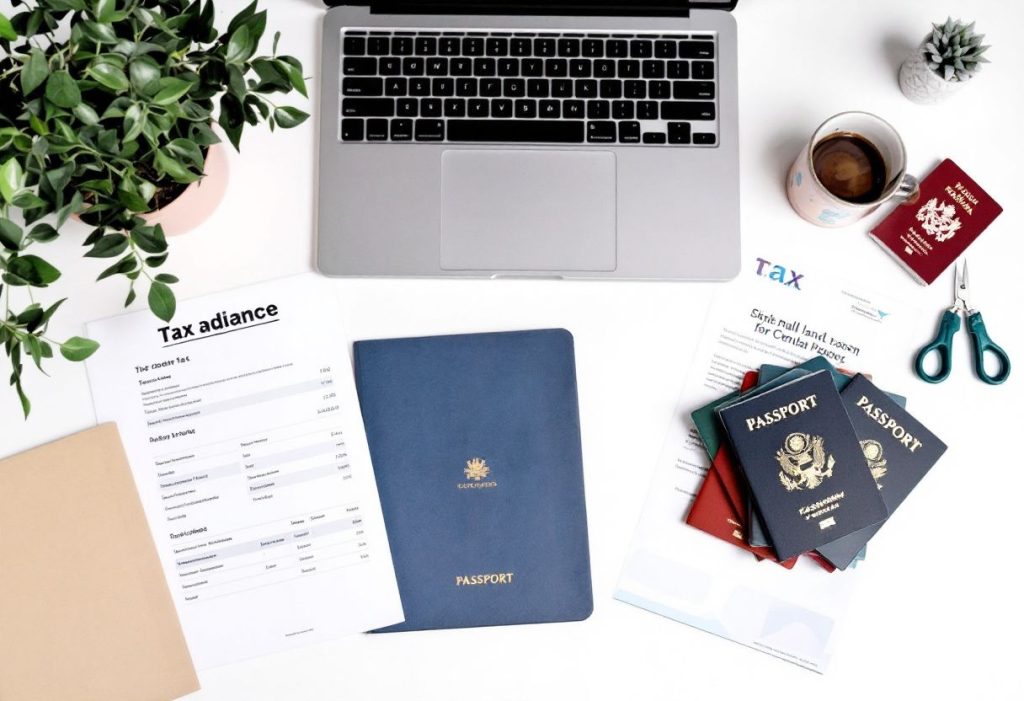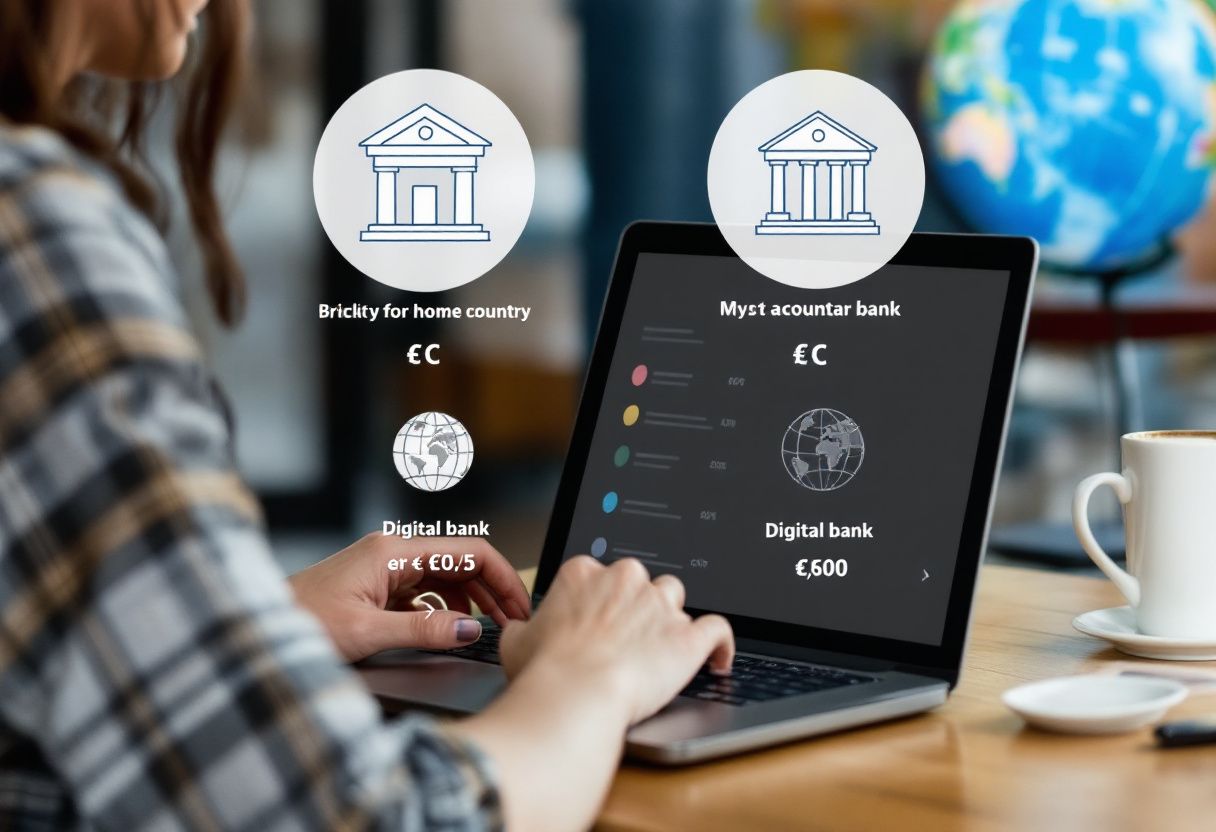Digital Nomad Banking and Financial Setup: Managing Money Across Borders
Understanding Digital Nomad Banking Fundamentals
Managing finances while traveling the world requires a sophisticated yet flexible banking setup. Digital nomads need banking solutions that work seamlessly across borders while providing security, accessibility, and cost-effective currency conversion.
International Banking Structure
Creating a robust international banking system begins with selecting the right combination of traditional and digital banks. Modern digital nomads typically need at least three types of accounts to operate effectively worldwide.
Primary Banking Setup
Your primary banking structure should include a combination of traditional and digital solutions. A typical setup includes:
Traditional Bank Account (Home Country):
- Maintains credit history
- Handles tax obligations
- Receives regular payments
- Manages recurring bills
Digital Banking Solutions:
Wise (formerly TransferWise) offers essential features:
- Multi-currency accounts
- Local bank details in major countries
- Competitive exchange rates
- Free international transfers
Revolut or N26 provides:
- Euro IBAN accounts
- Free ATM withdrawals
- Virtual cards for online purchases
- Real-time exchange notifications
Currency Management Strategies
Managing multiple currencies effectively can save thousands in exchange fees annually. Digital nomads should implement a strategic approach to currency management based on their travel patterns and income sources.
Multi-Currency Approach
Develop a system for handling different currencies efficiently. Hold balances in currencies you frequently use, considering both earning and spending patterns. Major currencies like USD, EUR, and GBP should form the core of your holdings, supplemented by currencies specific to your regular destinations.
Payment Reception Systems
Establishing reliable payment reception methods is crucial for digital nomads. Different clients may prefer different payment methods, so maintaining multiple options ensures steady cash flow.
Payment Platforms
PayPal Business:
- Widely accepted
- Instant transfers
- Higher fees (2.9% + fixed fee)
- Currency conversion challenges
Wise Business:
- Local bank details
- Lower fees
- Better exchange rates
- Professional invoicing
Stripe Atlas:
- US company formation
- Global payment processing
- Professional banking setup
- Tax compliance support
Emergency Access Planning
Digital nomads must prepare for financial emergencies while traveling. This includes establishing multiple access methods to funds and maintaining emergency reserves in accessible locations.
Access Strategy
Create a robust system for accessing your money:
- Multiple debit cards from different banks
- Credit cards from various institutions
- Emergency cash reserves in major currencies
- Digital payment apps across different platforms
Financial Security Measures
Protecting your financial assets while traveling requires additional security measures. Implement comprehensive security protocols to protect your banking information and access.
Security Protocols
Establish strong security measures:
- Two-factor authentication on all accounts
- VPN for banking access
- Secure password management
- Regular security audits
- Encrypted backup systems
Documentation Management
Maintaining proper financial documentation becomes more complex as a digital nomad. Develop systems for managing and accessing important financial documents remotely.
Digital Organization
Create a secure digital filing system:
- Bank statements
- Tax documents
- Investment records
- Insurance policies
- Legal documents
Cost Management Across Borders
Managing costs effectively across different countries requires careful planning and tracking. Develop systems for monitoring expenses in multiple currencies while maintaining accurate records for tax purposes.
Expense Tracking
Implement comprehensive tracking systems using tools like:
- Expensify for receipt management
- Excel for currency conversion tracking
- Mobile apps for daily expense logging
- Cloud storage for documentation
Banking Cost Optimization
Minimize banking fees through strategic account usage and timing of transactions. Understanding fee structures across different services helps optimize your banking costs.
Fee Reduction Strategies
Consider these approaches to reduce banking costs:
- Use local ATMs partnered with your bank
- Time large transfers with favorable exchange rates
- Maintain minimum balances to avoid fees
- Choose cards with no foreign transaction fees
Building Financial Resilience
As a digital nomad, building financial resilience is crucial. Establish systems that work regardless of your location while maintaining access to emergency funds and credit lines.
Emergency Planning
Create a comprehensive emergency fund structure:
- 6-12 months of living expenses
- Distributed across multiple accounts
- Accessible from anywhere
- Mixed currency holdings
Government Compliance Considerations
Understanding and maintaining compliance with banking regulations in various jurisdictions is essential for digital nomads. Stay informed about banking requirements and restrictions in countries where you operate.
Compliance Framework
Maintain compliance by:
- Understanding FATCA requirements
- Following CRS reporting obligations
- Maintaining accurate records
- Consulting with international tax experts
Future-Proofing Your Banking Setup
The financial landscape for digital nomads continues to evolve with new technologies and regulations. Stay adaptable and ready to integrate new financial solutions as they become available.
Keep your banking structure flexible enough to:
- Adopt new financial technologies
- Adapt to regulatory changes
- Incorporate improved security measures
- Optimize for changing travel patterns
Tax Planning and Compliance for Digital Nomads

Understanding International Tax Obligations
Managing taxes as a digital nomad presents unique challenges and opportunities. The complexity of international tax laws requires careful planning and thorough understanding of your obligations in different jurisdictions. Your tax liability often depends on various factors, including citizenship, residency status, and income sources.
Tax Residency Considerations
Tax residency forms the foundation of your international tax planning strategy. Different countries have varying criteria for determining tax residency, typically based on the number of days spent in the country and other connecting factors.
Common Tax Residency Tests
Countries often determine residency through:
- Physical presence (183 days rule in many countries)
- Permanent home availability
- Center of vital interests
- Habitual abode
- Economic ties
Understanding the 183-Day Rule
The 183-day rule appears in many tax systems worldwide, but its application varies significantly by country. Some nations count consecutive days, while others look at cumulative days over several years. Understanding how different countries interpret this rule is crucial for tax planning.
Global Income Reporting Requirements
For US citizens, worldwide income reporting remains mandatory regardless of location. The US tax system’s unique citizenship-based taxation requires careful planning and understanding of various exclusions and credits available to expatriates.
The Foreign Earned Income Exclusion (FEIE) allows qualifying US citizens to exclude up to $112,000 (2024 figure) of foreign earned income from US taxation. However, specific requirements must be met:
- Physical Presence Test
- Bona Fide Residence Test
- Tax Home Requirements
- Income Source Verification
Tax Treaties and Double Taxation
Understanding tax treaties between countries helps prevent double taxation on the same income. Most developed nations have extensive networks of tax treaties, though digital nomads must carefully consider how these treaties apply to their specific situations.
Avoiding Double Taxation
Several methods exist to prevent double taxation:
- Tax credits for foreign taxes paid
- Income exclusion agreements
- Treaty-based exemptions
- Special status provisions
Record Keeping and Documentation
Maintaining thorough records becomes especially crucial for digital nomads. Proper documentation helps prove your location, income sources, and tax compliance across multiple jurisdictions.
Essential records to maintain include:
- Travel documentation
- Bank statements
- Income receipts
- Tax payments
- Residency permits
Value Added Tax (VAT) Considerations
Digital nomads providing services to clients in various countries must understand their VAT obligations. The rules vary significantly between jurisdictions and can impact both pricing and compliance requirements.
VAT Registration Requirements
Consider VAT registration when:
- Exceeding country-specific thresholds
- Providing digital services to EU customers
- Operating in VAT-mandatory jurisdictions
- Selling physical products internationally
Tax Planning Strategies
Effective tax planning requires balancing compliance with optimization. Several strategies can help minimize tax burden while maintaining full compliance with applicable laws.
Company Structures
Consider establishing appropriate business structures:
- Foreign corporations
- Limited liability companies
- Sole proprietorships
- Partnership arrangements
Social Security Agreements
Understanding international social security agreements helps optimize mandatory contributions while ensuring future benefits. Many countries have bilateral agreements affecting how social security payments are handled for mobile workers.
Retirement Planning Considerations
International retirement planning requires special attention to tax implications and contribution rules. Different countries treat retirement accounts and contributions differently, necessitating careful planning.
Professional Support Network
Building a reliable network of tax professionals who understand international tax law becomes crucial. This network should include:
- International tax accountants
- Legal advisors
- Financial planners
- Local tax experts
Compliance Calendar Management
Create a comprehensive compliance calendar to track filing deadlines and reporting requirements across different jurisdictions. Important dates typically include:
- Tax return deadlines
- Estimated tax payments
- Information reporting requirements
- Foreign account disclosures
- Business filing obligations
Currency Considerations
Track exchange rates and maintain detailed records of currency conversions for tax purposes. Different tax authorities may require reporting in their local currency, necessitating careful documentation of conversion rates used.
Tax Software and Tools
Utilize appropriate software and tools designed for international tax management. These tools should help with:
- Income tracking
- Expense categorization
- Location documentation
- Tax calculation
- Document storage
Exit Planning
Develop clear strategies for changing tax residency or returning to your home country. Consider the tax implications of significant changes in your living situation and plan accordingly for transitions between tax jurisdictions.
Investment and Wealth Building for Digital Nomads

Building Wealth as a Location-Independent Professional
Creating and managing wealth while living a nomadic lifestyle presents unique challenges and opportunities. Digital nomads must develop investment strategies that work across borders while maintaining flexibility and accessibility. This comprehensive approach to wealth building requires careful consideration of various investment vehicles and asset classes.
International Investment Strategy
The foundation of successful wealth building for digital nomads lies in creating a diversified international investment portfolio. Access to global markets provides unique opportunities for diversification across countries, currencies, and asset classes.
Geographic Diversification
Spreading investments across multiple countries helps reduce risk and capture global growth opportunities. Consider allocating investments across:
- Developed Markets: 40-60%
- Emerging Markets: 20-30%
- Frontier Markets: 10-20%
- Home Country: Remaining balance
Investment Vehicle Selection
Digital nomads need investment vehicles that offer both accessibility and flexibility. The most suitable options typically include:
International Brokerage Accounts
- Interactive Brokers
- Charles Schwab International
- Fidelity International
- TD Ameritrade Global
These platforms provide access to:
- Global stock markets
- ETFs and mutual funds
- Bonds and fixed income
- Options and futures
Cryptocurrency and Digital Assets
Many digital nomads include cryptocurrency in their investment strategy. While volatile, crypto offers unique advantages for the location-independent lifestyle:
- Borderless transactions
- 24/7 market access
- Portfolio diversification
- Potential high returns
Real Estate Investment Strategies
Investing in real estate while maintaining a nomadic lifestyle requires creative approaches. Consider these options:
Real Estate Investment Trusts (REITs):
- Global exposure
- Professional management
- Regular income
- High liquidity
Real Estate Crowdfunding:
- Lower minimum investments
- Geographic diversification
- Passive income generation
- Project selection flexibility
Retirement Planning Across Borders
Planning for retirement as a digital nomad requires careful consideration of international regulations and tax implications. Focus on developing a retirement strategy that remains flexible and portable across borders.
Retirement Account Options
Consider establishing multiple retirement vehicles:
- Home country retirement accounts
- International pension plans
- Self-directed retirement accounts
- Investment-linked life insurance
Asset Protection Strategies
Protecting assets while living internationally requires careful planning and appropriate legal structures. Consider implementing:
- Offshore trust structures
- International LLCs
- Multiple jurisdiction planning
- Insurance strategies
Emergency Fund Management
Maintaining appropriate emergency reserves becomes crucial for digital nomads. Structure your emergency fund to provide:
- 6-12 months of living expenses
- Multiple currency holdings
- High accessibility
- Low-risk investments
Passive Income Development
Creating sustainable passive income streams provides financial security for digital nomads. Focus on developing:
- Dividend portfolios
- Rental income
- Digital product sales
- Licensing revenues
- Affiliate marketing
Risk Management
Managing investment risk across international markets requires careful planning and monitoring. Implement these risk management strategies:
- Regular portfolio rebalancing
- Stop-loss orders
- Currency hedging
- Insurance coverage
- Diversification across asset classes
Future Planning Considerations
Long-term planning for digital nomads should account for:
Life Transitions
- Potential settlement locations
- Family planning needs
- Career evolution
- Retirement goals
Estate Planning
- International asset distribution
- Cross-border inheritance
- Digital asset succession
- Tax efficiency
Technology Integration
Leverage technology for effective wealth management:
Investment Management Tools:
- Portfolio tracking apps
- Market analysis software
- Tax planning tools
- Wealth management platforms
Professional Support Network
Build relationships with key financial professionals:
- International tax advisors
- Investment managers
- Estate planners
- Insurance specialists
- Legal counsel
Implementation Strategy
Create a systematic approach to building and managing wealth:
- Monthly investment contributions
- Quarterly portfolio reviews
- Annual strategy assessments
- Regular professional consultations
By following these strategies while maintaining flexibility, digital nomads can build significant wealth while enjoying location independence.
